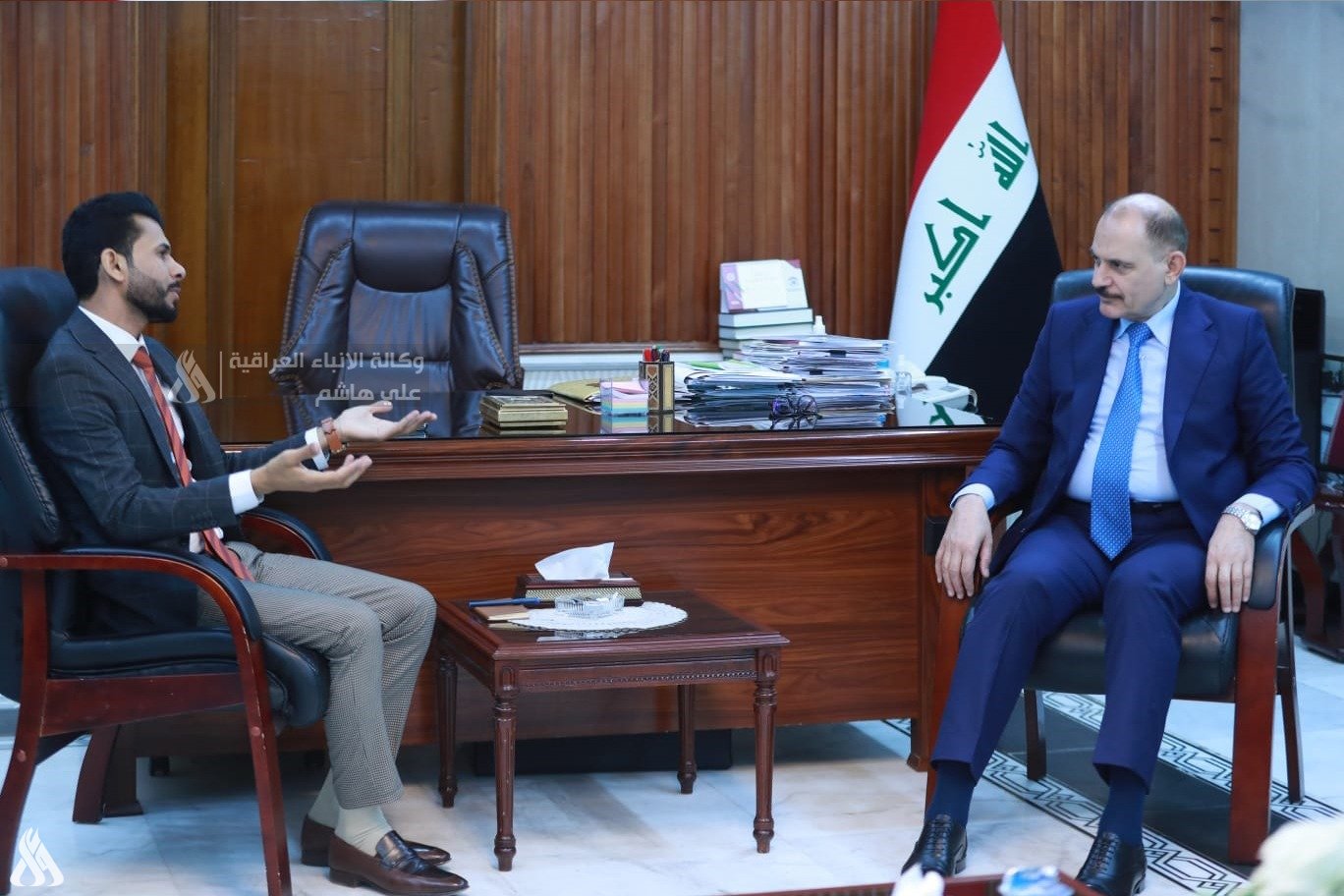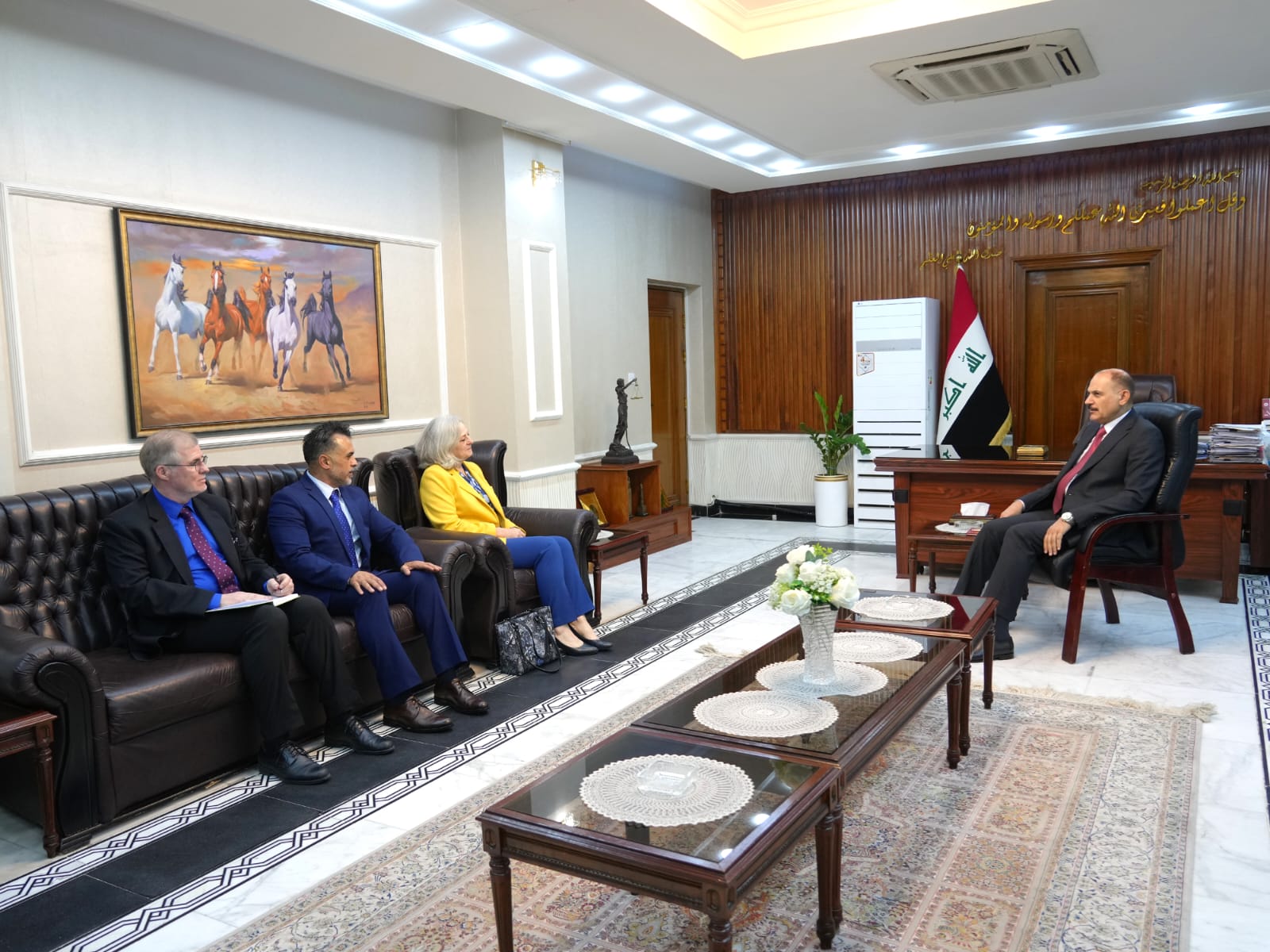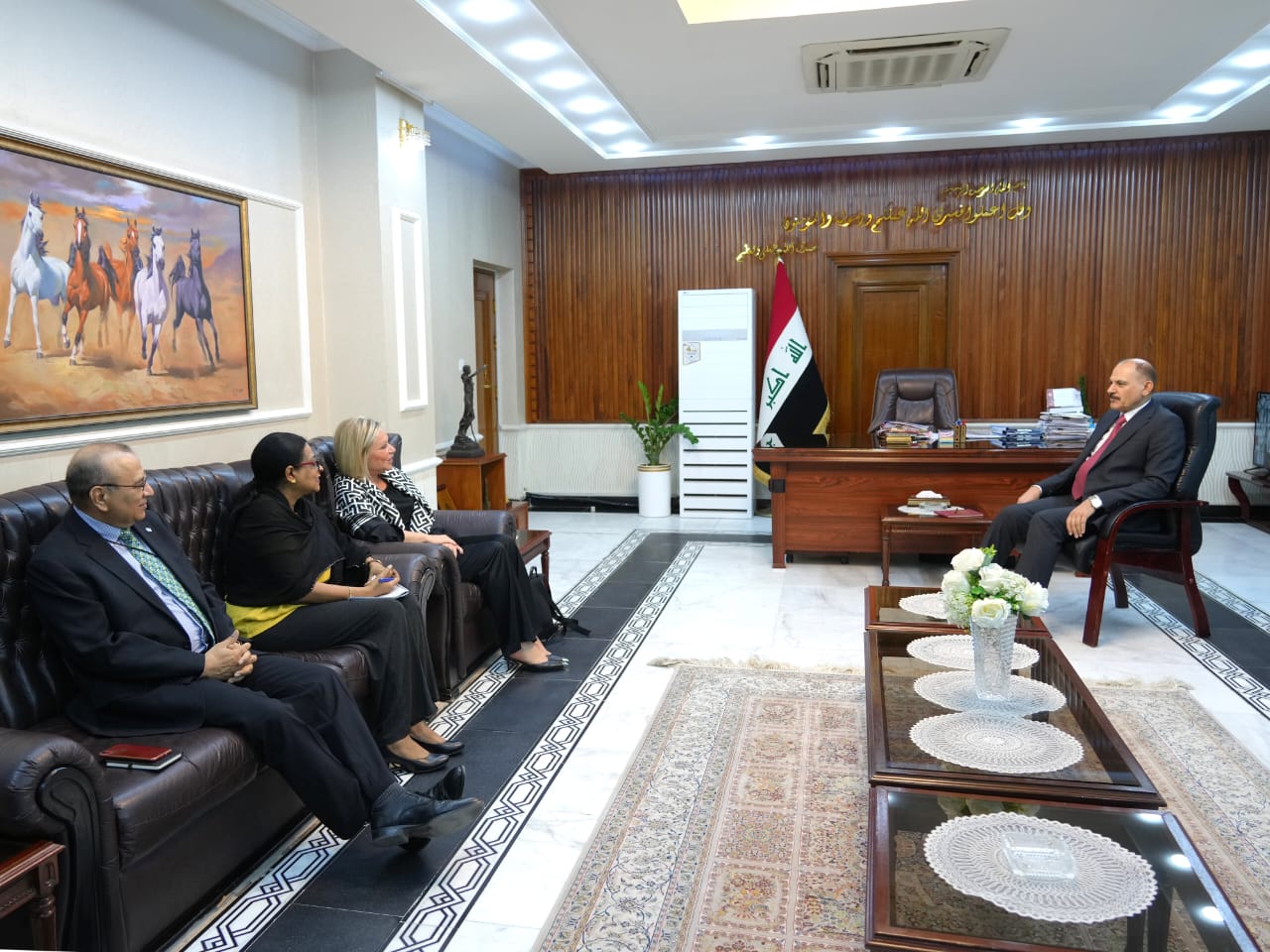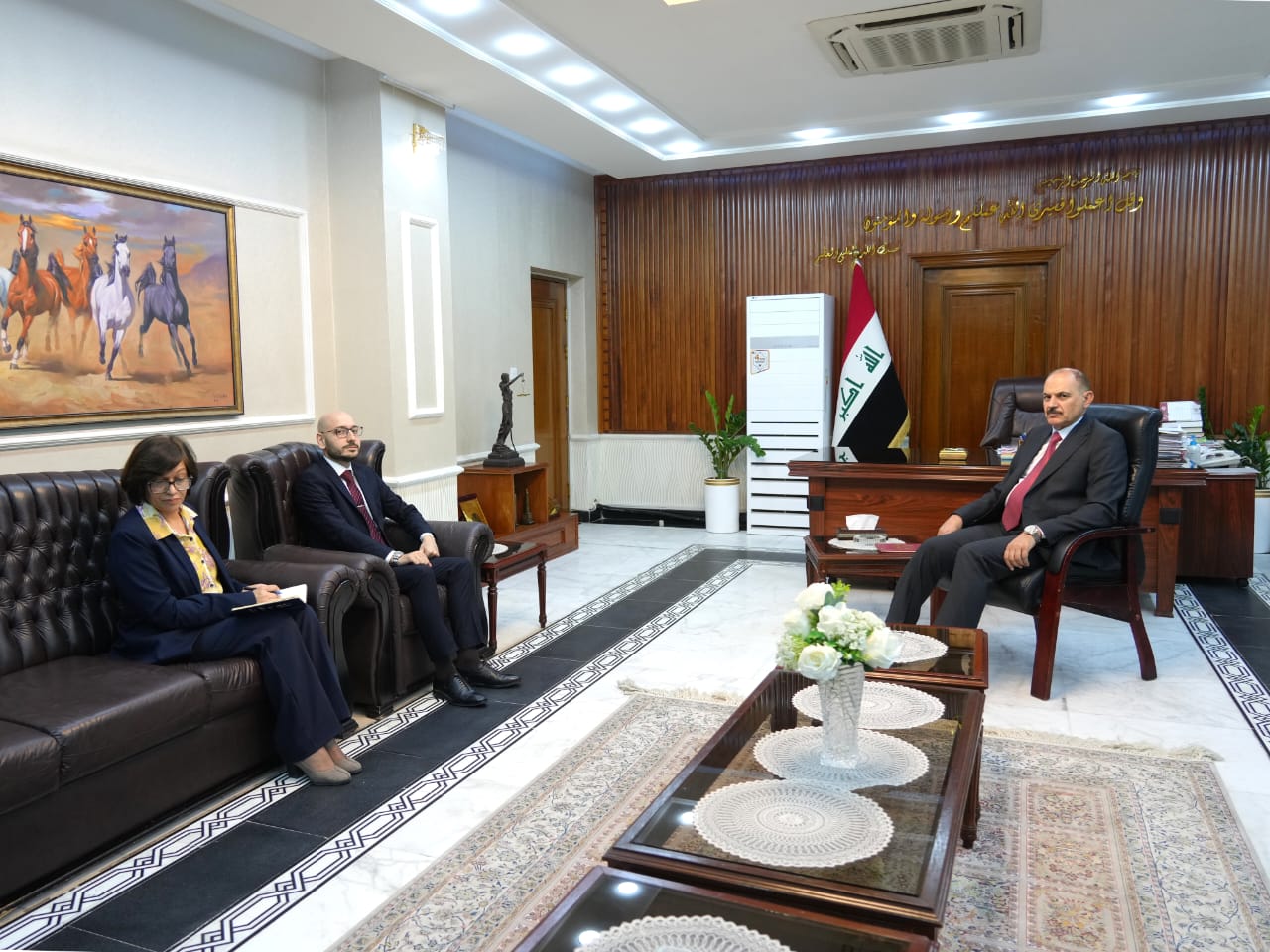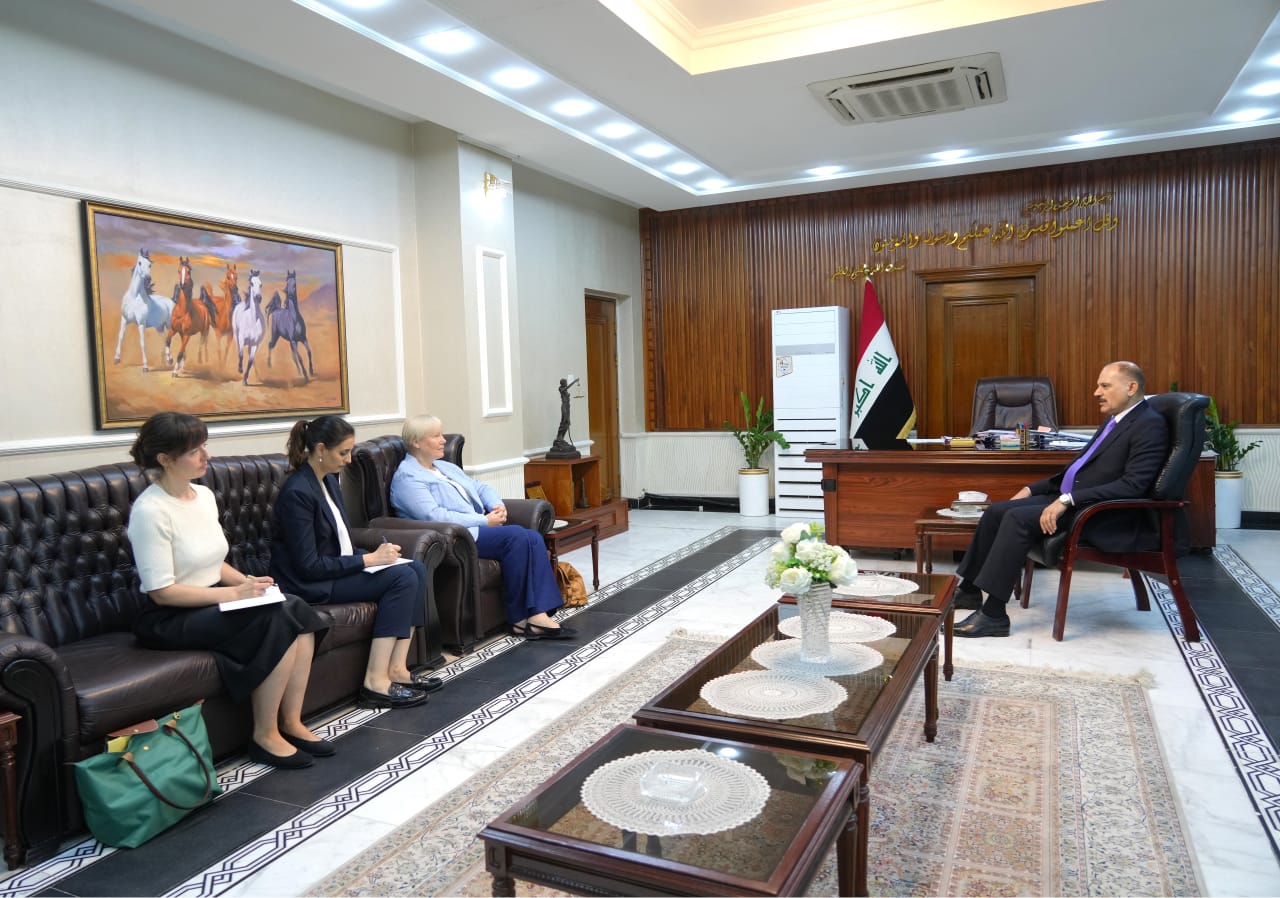
(INA) opens with the President of the Federal Supreme Court the files of the election of the Speaker of Parliament and the localization of the region's salaries and powers
Baghdad/ Media of the Federal Supreme Court
The President of the Federal Supreme Court, Judge Jassim Al-Amiri, on Tuesday, the possibility of proceeding with the session to elect the Speaker of the Council of Representatives despite filing a lawsuit on the session, and between that the sub-departments in the region can coordinate to localize the salaries of their employees, he pointed out that the Constitution established the court and defined its competencies under Article (93) of it.
Al-Amiri said in an interview with the Iraqi News Agency (INA) that "the failure to legislate the Federal Council Law, which the constitution requires to be the two wings of the legislative authority, is considered a defect and a lack of response to what the constitution wants."
He added that "the Council of Representatives relies in its work on several criteria, including those related to the members of the Council of Representatives, who represent the Iraqi people from north to south, which in turn represents the principles and values of the Iraqi people," noting that "the second framework under which the Council of Representatives works is the legislation of federal laws, while the Council of Representatives works within the third framework, which represents the womb from which the executive authority is born, while its role in the fourth framework is to control the executive authority."
He pointed out that "the Iraqi people made great sacrifices in order to reach the stage in which the state is built on democratic foundations and on the right citizenship," noting that "the Iraqi constitution was distinguished by defining the federal authorities and their competencies and the rights and freedoms of the general public, as well as defining the exclusive powers of the federal authorities and irregular for a region."
Al-Amiri stressed "the need to complete the presidency of parliament from a constitutional point of view and to elect a new president instead of the previous president," revealing that "the election of a new speaker of parliament does not depend on filing a lawsuit before the Federal Court or not, as this is due to the horizon and frameworks of political parties, and the failure to elect the speaker of parliament does not mean disrupting his work, but continues normally until the election of a new president."
He explained that "the lawsuit filed before the Federal Court related to the session to elect the speaker of parliament, the court is considering it in accordance with the constitution, but considering it does not mean that it is not possible to elect a new speaker of parliament and the election process can proceed."
He pointed out that "the file of re-nomination of Shaalan al-Karim for the presidency of parliament depends on what is decided by the parties that nominated him, but with regard to the termination of his membership, the court will consider it on time."
Salaries File Of The Region's Employees
He pointed out that "the decision of the Federal Court, which was issued, obligated the head of the federal government and the head of the regional government to settle the salaries of employees, retirees and beneficiaries of social protection with federal government banks and deduct from the region's share specified in the budget law."
He added that "the segments covered by the decision of the Federal Court proved that they did not receive monthly salaries regularly and on time, so the problems between the federal government and the region due to the non-implementation of the budget items cannot be the main reason for depriving the citizens of the region of their monthly salaries," pointing out that "the Federal Court indicated in the merits of its decision, that the competent authority in coordination between the Ministry of Finance and the Ministry of Finance of the region, which is the region's finances, but if the Ministry of Finance in the region objects to the implementation of the decision "Sub-departments can implement and coordinate directly with the government's Ministry of Finance."
He stressed that "Iraq under the parliamentary system seeks to build democratic institutions and consolidate the principles of democracy, explaining that democracy in Iraq is based on two main pillars, the first is the rotation of power, and the second is the circulation of wealth, as the rotation of power without the circulation of wealth we become in front of a great damage to the Iraqi people, and if wealth is traded without the rotation of power, we will become in front of a great tyranny."
He pointed out that "the pillars of the democratic process are the peaceful transfer of power through the democratic and constitutional institutions stipulated in the constitution, and the circulation of wealth among members of society," pointing out that "Article (111) of the constitution stipulated that oil and gas belong to all the Iraqi people, and the wealth resulting from oil and gas or resulting from other sources must be for all the Iraqi people."
He stressed: "It is not possible for an employee in the center and south to receive his monthly salary on time and meet all the needs of his family, at a time when another employee in the Kurdistan region is deprived of that," explaining that "with this approach, equality will not be achieved and this leads to a violation of the constitution."
He pointed out that "the political process in Iraq must be built according to the principle of equality according to Article (14) of the constitution regardless of national and sectarian decline," explaining that "one of the basic principles on which the constitution is based and on which the democratic process is based is equality before the law, and equality in rights and duties."
He stressed "the importance of the federal government working in accordance with what was stated in the decision to implement all the provisions of the aforementioned decision, considering that the decisions issued by the Federal Court and under Article (94) of the Constitution and Article (5) of the Federal Court Law are binding on all authorities."
The Constitutional Court
He explained that "the Constitutional Court was established in accordance with the provisions of Article (92) of the Constitution, which stipulated that the Federal Court is a financially and administratively independent judicial body and was established under the Federal Court Law No. 30 of 2005 amended," pointing out that "the Constitution is the one that established this court and defined its competencies under Article (93) thereof, and therefore the establishment of the Court came in application of a constitutional text, which gives the Court its constitutionality."
The Constitutional Texts about the Regions
Al-Amiri pointed out that "Article (119) of the constitution gave the right to each governorate or more to form a region based on a referendum request submitted in two ways: first, submitting a request from a third of the members in each of the provincial councils who aim to form a region, and the second: submitting the request of one tenth of the voters from each of the governorates that aim to form the region."
He added: "Thus, the formation of regions is a constitutional right for each province, whether that province belongs to the region or outside the region, considering that the federal system in the Republic of Iraq consists of a capital, regions and governorates of decentralization and local administration," noting that "under Article (117) of the Constitution approved the Constitution of Iraq upon its entry into force the Kurdistan region and its existing authorities as a federal region."
He continued, "Under Article (121), the constitution granted the authorities of the region the right to exercise legislative, executive and judicial powers in accordance with the provisions of the constitution, except for the exclusive exceptions to the federal authorities, and therefore the constitution of the Republic of Iraq gave the right to each province and more to form the region in accordance with what was stated in item I and II of Article (121) of the constitution."
He pointed out that "the constitution also recognized the Kurdistan region as a federal region and all its existing powers, noting that the Kurdistan region has the right to amend the application of federal law in the region and not amend the law in the event of a contradiction or conflict between federal law and regional law regarding a matter that does not fall within the exclusive competences of the federal authorities."
He stressed that "the purpose of what was stated in the constitution, first: to build a democratic system based on the principle of sovereignty of law and the people is the source of powers exercised by direct secret ballot, while the second purpose of the constitution is to achieve the principle of peaceful rotation of power, while the third purpose of the constitution is to preserve the rights and public freedoms of all the Iraqi people in a way that secures the achievement of equality, equal opportunities and fair distribution of the country's wealth, that is, achieving the principle of social justice in the distribution of the country's wealth."
He went on to say: "Therefore, if these principles do not exist, we will be in front of a violation of the constitution, because the basis under which the constitution was legislated is to achieve the supreme interest of the people and the country, and this interest lies in building a democratic system on sound foundations and sovereignty in which the people are located, and the people are the source of authorities by holding free and fair elections that guarantee the participation of all, and ensure that all Iraqis, men and women, enjoy all civil and political rights, including the right to vote, vote and be nominated."
He pointed out that "the absence of social justice, the absence of fair distribution of wealth and the absence of the principle of equal opportunities are all a major violation of the constitution and a destruction of the political process, as this is inconsistent with the correct foundations for building a democratic system based on the participation of all in the management of the country's affairs."
